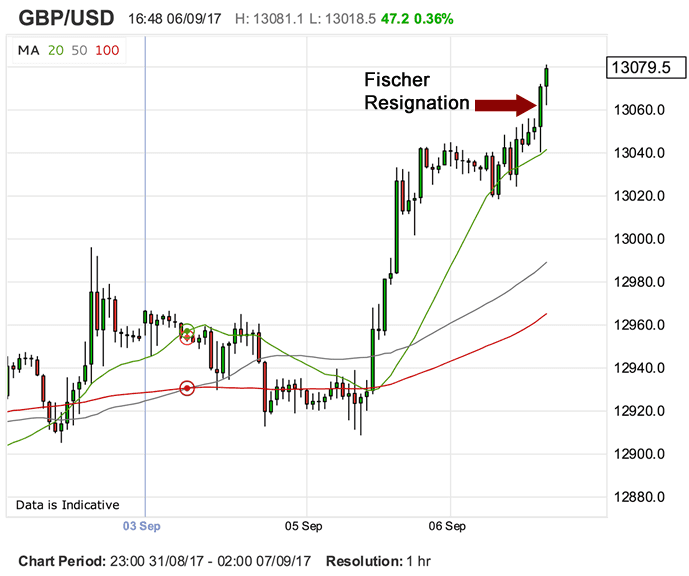Fed's Fischer Resigns, Helps Pound-to-Dollar Rate Takes Another Leg Higher
- Written by: Gary Howes

Pound Sterling added to this week's gains against the US Dollar on news the Vice-Chair of the US Federal Reserve has resigned.
Stanley Fischer sent a resignation letter to President Donald Trump saying:
"It has been a great privilege to serve on the Federal Reserve Board and, most especially, to work alongside Chair Yellen as well as many other dedicated and talented men and women throughout the Federal Reserve System.”
News of the resignation correlates with another leg-up in the Pound-to-Dollar exchange rate which has enjoyed a concerted uptrend this week taking it to a fresh high at 1.3075.

“The resignation of Fed Vice-Chairman Stanley Fischer adds further uncertainty to the already murky outlook for the future of the central bank's leadership,” says Royce Mendes at CIBC World Markets.
Fischer cited personal reasons in his letter to Trump, with his health possibly the cause.
“Of course there's also uncertainty surrounding who will be sitting atop the FOMC in 2018,” says Mendes.
Chair Yellen's term expires early next year and President Trump has been reluctant to confirm whether or not she will be re-appointed.
“That being said, the other most likely candidate for the position is Gary Cohn who would likely continue the gradualist approach to monetary tightening. So, while it's true that a dark horse candidate like John Taylor could adopt a more hawkish tact, the most likely scenario remains a soft touch on future rate hikes,” says Mendes.
Get up to 5% more foreign exchange by using a specialist provider by getting closer to the real market rate and avoid the gaping spreads charged by your bank for international payments. Learn more here.
Fischer was appointed to the Board by President Obama for an unexpired term ending January 31, 2020.
His term as Vice Chairman expires on June 12, 2018. During his time on the Board, he served as chairman of the Board's Committee on Financial Stability as well as the Committee on Economic and Financial Monitoring and Research.
He represented the Board internationally including at the Financial Stability Board, the Bank for International Settlements, the Group of 20, the Group of Seven, the International Monetary Fund, and the Organisation for Economic Co-operation and Development.
Before joining the Board, Fischer was governor of the Bank of Israel, from 2005 to 2013.
He was vice chairman of Citigroup from February 2002 to April 2005. He served as first deputy managing director of the International Monetary Fund from September 1994 through August 2001.
From January 1988 to August 1990, he was the chief economist of the World Bank. He was a professor of economics at the Massachusetts Institute of Technology from 1977 to 1999 and associate professor from 1973 to 1977.
Prior to joining the faculty at MIT, he was an assistant professor of economics and postdoctoral fellow at the University of Chicago.
Fischer was born in Lusaka, Zambia, in October 1943. He received his B.Sc. and M.Sc. in economics from the London School of Economics. He received his Ph.D. in economics from the Massachusetts Institute of Technology in 1969.




